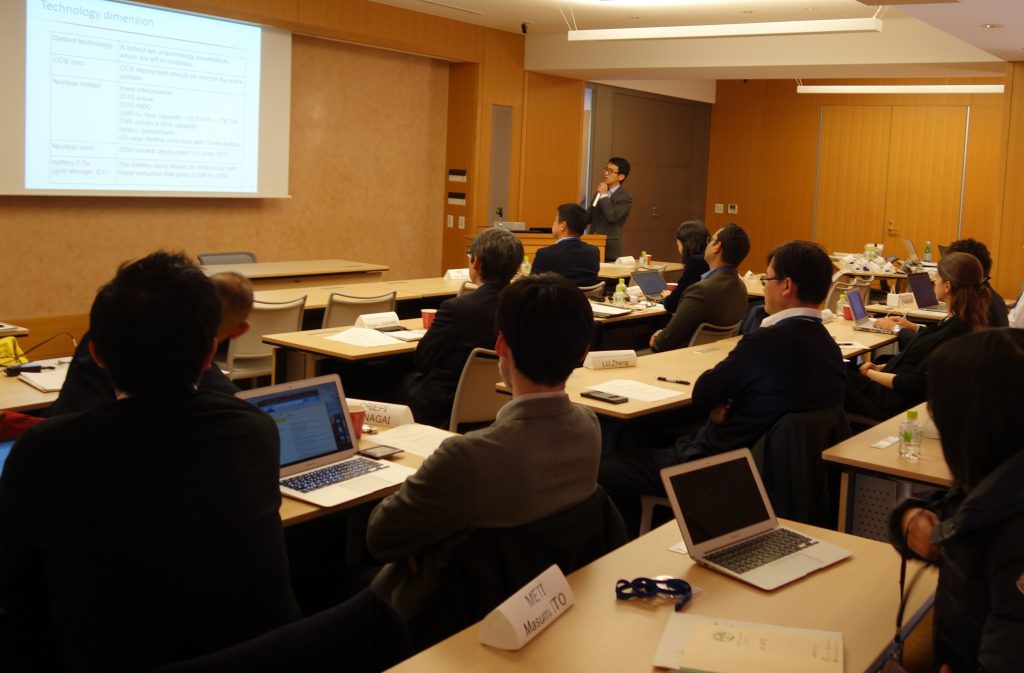ニュース
First International Workshop of JMIP(2017年12月14-15日開催)2017.12.10
First International Workshop of JMIP:
Japan Model Intercomparison Project: Assessment of long-term climate policy
This workshop is supported by
the Environment Research and Technology Development Fund 2-1704 of the Environmental Restoration and Conservation Agency(ERCA) and
The Canon Institute for Global Studies (CIGS)

DATE
14-15 December, 2017
VENUE
Ito International Research Center, The University of Tokyo, Tokyo, Japan (Hongo Campus)
ORGANIZER
Policy Alternative Research Institute, The University of Tokyo
OBJECTIVE
The Paris Agreement has created a new bottom-up framework, where each member state submits its own climate policy every 5 years. To assess the efforts of each country, it is crucial to scientifically examine climate policy proposals. Integrated assessment models are often used for such an scientific exercise, and enough attention must be paid to uncertainties and modeling assumptions, including equity considerations
In this workshop, we invite leading modeling researchers from Japan and Asia to discuss the ongoing modeling research in respective countries. The aim is to learn the state-of-the-art of modeling as well as frank exchanges of research ideas and discuss similar issues such as a large presence of heavy industry an increasing penetration of renewables.
The workshop is part of an ongoing research project, JMIP (Japan Model Intercomparison Project). It primarily funded by the Ministry of the Environment, Japan, under the Environment Research and Technology Development Fund 2-1704 of the Environmental Restoration and Conservation Agency.
TIMETABLE
Day 1 – December 14 (Thu.) 2017
Overview (chair: Masa Sugiyama)
11:00-12:00 Nobuhiro Kino (MOE): Welcome
Masa Sugiyama (UTokyo): Workshop overview
Ken Wada (RITE): UNFCCC/IPCC updates;How does scientific assessment contribute to the political process?
Jun Arima (UTokyo): Japan’s Mid-Long-Term Climate Strategy
12:00-13:00 Lunch
Modeling Japan’s climate policy / energy storage prospects (chair: Ken Wada)
13:00-14:00 Masa Sugiyama (UTokyo): Project overview, timeline JMIP scenario design and preliminary results
Yuhji Matsuo (IEEJ): Nuclear scenario
14:00-14:30 Ken Oshiro (Mizuho):Mid-century scenarios in Japan: some insights from CD-LINKS
14:30-15:00 Frank Ling (Anthropocene Institute): Powering Up: The Future of Batteries
15:00-15:30 Atsushi Kurosawa (IAE): Energy Storage Roadmap
15:30-16:00 Break
Renewable challenges (chair: Shincirho Fujimori)
16:00-16:30 Elmar Kriegler (PIK) (over Skype):
16:30-17:00 Ryoichi Komiyama (UTokyo):Large-scale Renewable Energy Integration in Japan
17:00-17:30 Martin Tengler (BNEF):Japan’s Long-Term Energy Outlook
17:30-17:45 Wrap-up
Day 2 – December 15 (Fri.) 2017)
Modeling across Asia (chair: Yuhji Matsuo))
09:45-10:00 Masa Sugiyama (UTokyo): Review of the first day
10:00-12:30 Melissa Lott (APERC, Japan): Modeling Energy Supply & Demand for APEC
Sueng Jick Yoo: (Korea) :GHGs emission reduction target and policy in Korea
Chang Shiyan (Tsinghua, China): Low Carbon Energy Transition in China
Fu Sha and Chai Qimin (NCSC, China): China’s modeling exercise relevant to NDC implementation and longer-term pathways
Vaibhav Chaturvedi (CEEW, India): Sustainable Development, Uncertainties, and India’s International Climate Commitments
12:30-13:30 Group photo & Lunch
Challenge of industrial decarbonization (chair:Shinichiro Fujimori))
13:30-14:00 Reina Kawase (LBERI): Industry decarbonization – case study of steel-
14:00-14:30 Junichiro Oda (RITE): Energy intensity of Japanese steel industry: Trend, determinants, and decarbonization challenge
Research agendas for long-term mitigation in Asia (group discussion) )
(chair: Masa Sugiyama)
14:30-15:00 Group discussion (common research questions / regional variations)
Discussion on JMIP scenario design and next step (chair: Masa Sugiyama))
15:00-15:30 Group discussion (R2 scenarios/ survey / standardization / documentation)
Special student session (chair: Ryoichi Komiyama))
15:30-15:45 Masaru Nakahara (UTokyo): Assessment of Direct Air Capture with Global Energy System Model
15:45-16:00 Motoi Isoga (UTokyo): Development of Dynamic Multi-sector Energy Economic Model Elaborating Electricity Sectors
16:00 Meeting adjournment
 東京大学政策ビジョン研究センター
東京大学政策ビジョン研究センター